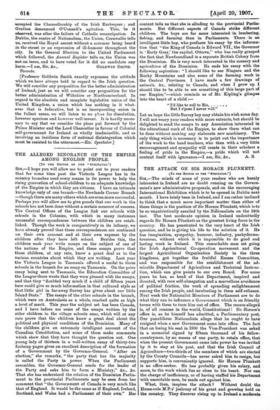THE ALLEGED IGNORANCE OF THE EMPIRE AMONG ENGLISH PEOPLE.
[To Tim EDITOR Or THE SPECTATOR:] Sin,—I hope you will allow me to point out to your readers that for some time past the Victoria League has in its country branches used every means in its power to help the rising generation of school-children to an adequate knowledge of the Empire in which they are citizens. I have an intimate knowledge only of one branch—the Newlands Corner Branch —though there are many others which are even more successful. Perhaps you will allow me to give proofs that our work in the schools has not been done without a certain measure of success. The Central Offices of the League link our schools with schools in the Colonies, with which in many instances successful correspondences between the children are estab- lished. Though the work is comparatively in its infancy, we have already proved that these correspondences are continued on their own account and at their own expense by the children after they have left school. Besides this, the children each year write essays on the subject of one of the nations of the Empire, and these essays prove that these children, at any rate, know a great deal as to the various countries about which they are writing. Last year the Victoria League in Tasmania offered a medal to three schools in the branch for an essay on Tasmania. On the prize essay being sent to Tasmania, the Education Committee of the League there wrote that they were pleased with the essays, and that they "doubted very nutch if a child of fifteen years here could give so much information in that cultured style as that little girl in far-away Surrey has given about our little Island State." The essays of the other schools in the branch, which were on Australasia as a whole, reached quite as high a level of merit. This year the subject set has been Canada, and I have before use some of the essays written by the elder children in the village schools near, which will at any rate prove that the children know a great deal about the political and physical conditions of the Dominion. Many of the children give an extremely intelligent account of the Canadian Constitution, and some of them make comments which show that they have thought the question out. One young lady of thirteen in a well-written essay of thirty-two foolscap pages gives an excellent description of the formation of a Government by the Governor-General. "Alter an election," she remarks, "the party that has the majority is called the Party in power. When the Parliament assembles, the Governor-General seirds for the leader of the Party and asks him to form a Ministry," &a, Ste. That she has understood the relation of the Dominion Parlia- ment to the provincial Parliaments may be seen from her comment that "the Government of Canada is very much like that of England. It would be the same as if England, Ireland, Scotland, and Wales had a Parliament of their own." Her context tells us that she is alluding to the provincial Pcelis- menta. But different aspects of Canada strike different children. The boys are far more interested in lumbering, fishing, and farming than in Parliaments. There. is an intelligent little boy, who prefaces his essay by the informa- tion that "the Kingof Canada is Edward VII., the Governor is 'Early Grey,' the capital, Ottawa," who has really graspect the fact that Newfoundland is a separate British Colony from the Dominion. He is very much interested in the scenery and agriculture of the Dominion. He ends his essay with the following aspiration: "I should like to see Niagara and the Rocky Mountains and also some of the farming. work in the Central Provinces. I have made a few drawings of animals, Scc., relating to Canada, and when I grow up I should like to be able to see something of this large part of our Empire,"—which reminds us of Mr. Kipling's glimpse into the heart of a child :—
"I'd like to roll to Rio, But I Wpm, I never will."
Let us hope the little Surrey boy may obtain his wish some day. I will not weary your readers with more extracts, but should be delighted to send the essays to any Association interested in the educational work of the Empire, to show them what can be done without making any elaborate new machinery. The only thing which is necessary is to point out the importance of the work to the head teachers, who then with a very little encouragement and sympathy will create in their scholars a feeling of pride in the Empire,—a pride which will not content itself with ignorance.—I am, Sir, etc., A. S.










































 Previous page
Previous page